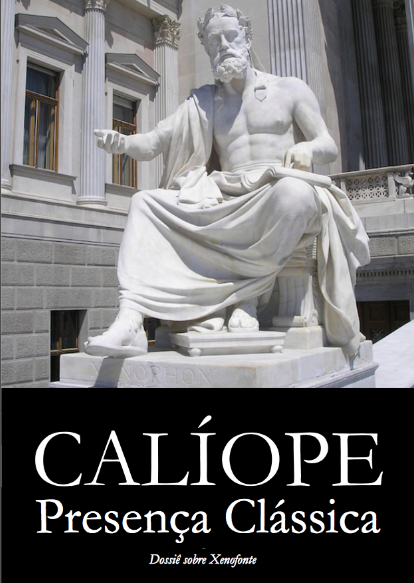O MELHOR DOS AQUÊMIDAS: BENEVOLÊNCIA, INTERESSE PRÓPRIO E A LEITURA ‘IRÔNICA’ DA CIROPÉDIA
DOI :
https://doi.org/10.17074/cpc.v1i41.43364Mots-clés :
Antiguidade clássica, Xenofonte, Ciropédia, benevolência, ironia, CiroRésumé
Críticos argumentam que, apesar de manter uma aparência de benevolência, na realidade, Ciro está sempre incansavelmente buscando o seu próprio interesse. Isto, porém, é uma dicotomia falsa. Para Xenofonte, a busca dos próprios interesses não contradiz nem a benevolência nem a beneficência. Ao contrário, a benevolência e a beneficência contribuem para a obtenção dos objetivos de interesse próprio e portanto a busca dos interesses próprios requerem ambas (vejaMemorabilia3.1.10, Oeconomicus 12.15). Isso se deve pois as posses mais úteis são os amigos e eles são adquiridos por atos de benevolência. A questão mais complicada é o conflito entre o interesse próprio e os interesses dos amigos e aliados. Contudo, conflitos entre interesses sinceros, em oposição aos desejos e vontades não precisam surgir com freqüência uma vez que diferentes indivíduos merecem e se beneficiam de coisas diferentes. Esta compatibilidade de interesses é ilustrada particularmente quando Ciro leva a melhor sobre seu tio Ciaxares. Ao invés do fato tê-lo prejudicado, ele avança os interesses de ambos simultaneamente.
Références
Ambler, W., 2001, The Education of Cyrus (Ithaca).
Azoulay, V., 2004a, ‘Xénophon, la Cyropédie et les eunuques’, Revue française d’histoire des idées politiques 11: 3–26.
———, 2004b, Xénophon et les grâces du pouvoir (Paris).
Breebaart, A.B., 1983, ‘From victory to peace: some aspects of Cyrus’ state in Xenophon’s Cyropaedia’, Mnemosyne 36: 117–134.
Carlier, P., 1978, ‘L’idée de monarchie impériale dans la Cyropédie de Xénophon’, Ktema 3, 133–163. (Reimpresso em tradução para o inglês em Gray 2010: 327–366.)
Danzig, G., 2007, ‘Xenophon’s wicked Persian or, What’s wrong with Tissaphernes? Xenophon’s view on lying and breaking oaths’, in C.J. Tuplin (ed.), Persian Responses: Political and Cultural Interaction with(in) the Achaemenid Empire (Swansea): 27–50.
———, 2009, ‘Big boys and little boys: justice and law in Xenophon’s Cyropaedia and Memorabilia’, Polis 26: 271–285.
———, 2010, Apologizing for Socrates (Lanham).
Dorion, L.-A., 2001, ‘L’exégèse straussienne de Xénophon: le cas paradigmatique de Mémorables IV 4’, in M. Narcy & A. Lacks (edd.), Figures de Socrate (Villeneuved’Ascq): 87–117.
———,2002, ‘La responsibilité de Cyrus dans le déclin de l’empire Perse selon Platon et Xénophon’, Revue française d’histoire des idées politiques 16: 369–386.
Due, B., 1989, The Cyropaedia (Aarhus).
Farber, J., 1979, ‘The Cyropaedia and Hellenistic kingship’, AJP 100: 497–514.
Gera, D., 1993, Xenophon’s Cyropaedia (Oxford).
———, 2007, ‘Xenophon’s Socrateses’, in M. Trapp (ed.), Socrates from Antiquity to the Enlightenment (Aldershot): 33–50.
Gray, V., 2010, Oxford Readings in Classical Studies: Xenophon (Oxford).
———, 2011, Xenophon’s Mirror of Princes (Oxford).
Higgins, W.E., 1977, Xenophon the Athenian: The Problem of the Individual and the Society of the Polis (Albany).
Hirsch, S., 1985, The Friendship of the Barbarians (Hanover & London).
Huss, B., 1999, ‘The dancing Socrates and the laughing Xenophon, or The Other Symposium’, AJP 120: 381–410. (Reimpresso em Gray 2010: 257–282.)
Johnson, D., 2003, ‘Xenophon’s Socrates on justice and the law’, Ancient Philosophy 23: 255–281.
———, 2005, ‘Persians as centaurs in Xenophon’s Cyropaedia’, TAPA 135: 177–207.
Luccioni, J., 1947, Les idées politiques et sociales de Xénophon (Paris).
Morrison, D., 1995, ‘Xenophon’s Socrates on the just and the lawful’, Ancient Philosophy 15, 329–347.
———, 2008, ‘Remarques sur la psychologies morale de Xénophon’, in M. Narcy & A. Tordesillas (edd.), Xénophon et Socrates (Paris): 11–27.
Mueller-Goldingen, C., 1995, Untersuchungen zu Xenophons Kyrupädie (Stuttgart).
Nadon, C., 2001, Xenophon’s Prince. Republic and Empire in the Cyropaedia (Berkeley).
Newell, W.R., 1983, ‘Tyranny and the science of ruling in Xenophon’s Education of Cyrus’, Journal of Politics 45: 889–906.
Pangle, T., 1994, ‘Socrates in the context of Xenophon’s political writings’, in P.A. Vander Waerdt (ed.), The Socratic Movement (Ithaca): 127–150.
de Romilly, J., 1979, La douceur dans la pensée grecque (Paris).
Rosen, S., 2005, Plato’s Republic: A Study (New Haven).
Sage, P.W., 1994, ‘Dying in style: Xenophon’s ideal leader and the end of the Cyropaedia’, CJ 90: 161–174.
Stadter, P., 1991, ‘Fictional narrative in the Cyropaedia’, AJP 112: 461–491.
Tatum, J., 1989, Xenophon’s Imperial Fiction (Princeton).
Too, Y.L. 1998, ‘Xenophon’s Cyropaedia: disfguring the pedagogical state’, in Y.L.
Too &N. Livingstone (edd.), Pedagogy and Power: Rhetorics of Classical Learning (Cambridge): 282–302.
Tuplin, C.J., 1993, The Failings of Empire (Stuttgart).
———, 1997, ‘Xenophon’s Cyropaedia: education and fiction’, in A.H. Sommerstein & C. Atherton (edd.), Education in Greek Fiction (Bari): 65–162.
Weathers, W., 1953, ‘Xenophon’s political idealism’, CJ 49: 317–321; 330.
Wood, N., 1964, ‘Xenophon’s theory of leadership’, C&M 25: 33–66.
Téléchargements
Publiée
Numéro
Rubrique
Licence
Autores que publicam nesta revista concordam com os seguintes termos:
Autores mantém os direitos autorais e concedem à revista o direito de primeira publicação, com o trabalho simultaneamente licenciado sob a Licença Creative Commons Attribution que permite o compartilhamento do trabalho com reconhecimento da autoria e publicação inicial nesta revista.
Autores têm autorização para assumir contratos adicionais separadamente, para distribuição não-exclusiva da versão do trabalho publicada nesta revista (ex.: publicar em repositório institucional ou como capítulo de livro), com reconhecimento de autoria e publicação inicial nesta revista.
Autores têm permissão e são estimulados a publicar e distribuir seu trabalho online (ex.: em repositórios institucionais ou na sua página pessoal) a qualquer ponto antes ou durante o processo editorial, já que isso pode gerar alterações produtivas, bem como aumentar o impacto e a citação do trabalho publicado (Veja O Efeito do Acesso Livre).


